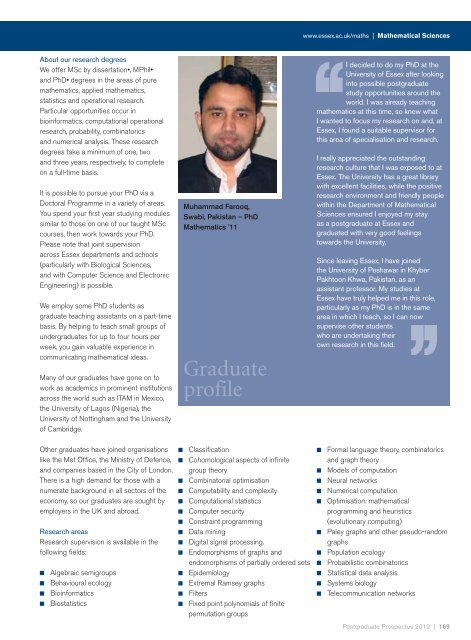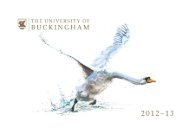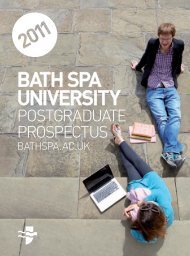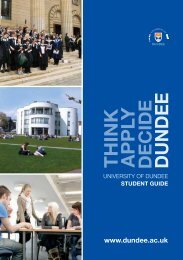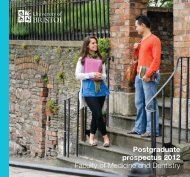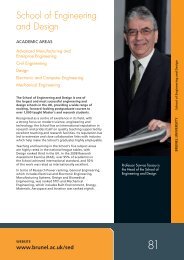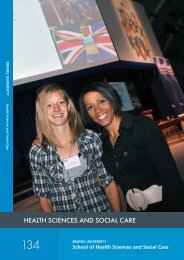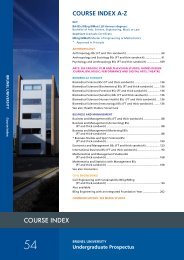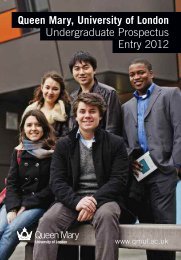Postgraduate Prospectus
Postgraduate Prospectus
Postgraduate Prospectus
Create successful ePaper yourself
Turn your PDF publications into a flip-book with our unique Google optimized e-Paper software.
www.essex.ac.uk/maths | Mathematical Sciences<br />
About our research degrees<br />
We offer MSc by dissertation•, MPhil•<br />
and PhD• degrees in the areas of pure<br />
mathematics, applied mathematics,<br />
statistics and operational research.<br />
Particular opportunities occur in<br />
bioinformatics, computational operational<br />
research, probability, combinatorics<br />
and numerical analysis. These research<br />
degrees take a minimum of one, two<br />
and three years, respectively, to complete<br />
on a full-time basis.<br />
It is possible to pursue your PhD via a<br />
Doctoral Programme in a variety of areas.<br />
You spend your first year studying modules<br />
similar to those on one of our taught MSc<br />
courses, then work towards your PhD.<br />
Please note that joint supervision<br />
across Essex departments and schools<br />
(particularly with Biological Sciences,<br />
and with Computer Science and Electronic<br />
Engineering) is possible.<br />
We employ some PhD students as<br />
graduate teaching assistants on a part-time<br />
basis. By helping to teach small groups of<br />
undergraduates for up to four hours per<br />
week, you gain valuable experience in<br />
communicating mathematical ideas.<br />
Many of our graduates have gone on to<br />
work as academics in prominent institutions<br />
across the world such as ITAM in Mexico,<br />
the University of Lagos (Nigeria), the<br />
University of Nottingham and the University<br />
of Cambridge.<br />
Muhammad Farooq,<br />
Swabi, Pakistan – PhD<br />
Mathematics ’11<br />
Graduate<br />
profile<br />
I decided to do my PhD at the<br />
University of Essex after looking<br />
into possible postgraduate<br />
study opportunities around the<br />
world. I was already teaching<br />
mathematics at this time, so knew what<br />
I wanted to focus my research on and, at<br />
Essex, I found a suitable supervisor for<br />
this area of specialisation and research.<br />
I really appreciated the outstanding<br />
research culture that I was exposed to at<br />
Essex. The University has a great library<br />
with excellent facilities, while the positive<br />
research environment and friendly people<br />
within the Department of Mathematical<br />
Sciences ensured I enjoyed my stay<br />
as a postgraduate at Essex and<br />
graduated with very good feelings<br />
towards the University.<br />
Since leaving Essex, I have joined<br />
the University of Peshawar in Khyber<br />
Pakhtoon Khwa, Pakistan, as an<br />
assistant professor. My studies at<br />
Essex have truly helped me in this role,<br />
particularly as my PhD is in the same<br />
area in which I teach, so I can now<br />
supervise other students<br />
who are undertaking their<br />
own research in this field.<br />
Other graduates have joined organisations n<br />
like the Met Office, the Ministry of Defence, n<br />
and companies based in the City of London.<br />
There is a high demand for those with a n<br />
numerate background in all sectors of the n<br />
economy, so our graduates are sought by n<br />
employers in the UK and abroad.<br />
n<br />
n<br />
Research areas<br />
n<br />
Research supervision is available in the n<br />
following fields:<br />
n<br />
n Algebraic semigroups<br />
n Behavioural ecology<br />
n Bioinformatics<br />
n Biostatistics<br />
n<br />
n<br />
n<br />
n<br />
Classification<br />
Cohomological aspects of infinite<br />
group theory<br />
Combinatorial optimisation<br />
Computability and complexity<br />
Computational statistics<br />
Computer security<br />
Constraint programming<br />
Data mining<br />
Digital signal processing.<br />
Endomorphisms of graphs and<br />
endomorphisms of partially ordered sets<br />
Epidemiology<br />
Extremal Ramsey graphs<br />
Filters<br />
Fixed point polynomials of finite<br />
permutation groups<br />
n<br />
n<br />
n<br />
n<br />
n<br />
n<br />
n<br />
n<br />
n<br />
n<br />
n<br />
Formal language theory, combinatorics<br />
and graph theory<br />
Models of computation<br />
Neural networks<br />
Numerical computation<br />
Optimisation: mathematical<br />
programming and heuristics<br />
(evolutionary computing)<br />
Paley graphs and other pseudo-random<br />
graphs<br />
Population ecology<br />
Probabilistic combinatorics<br />
Statistical data analysis<br />
Systems biology<br />
Telecommunication networks<br />
<strong>Postgraduate</strong> <strong>Prospectus</strong> 2012 | 169


